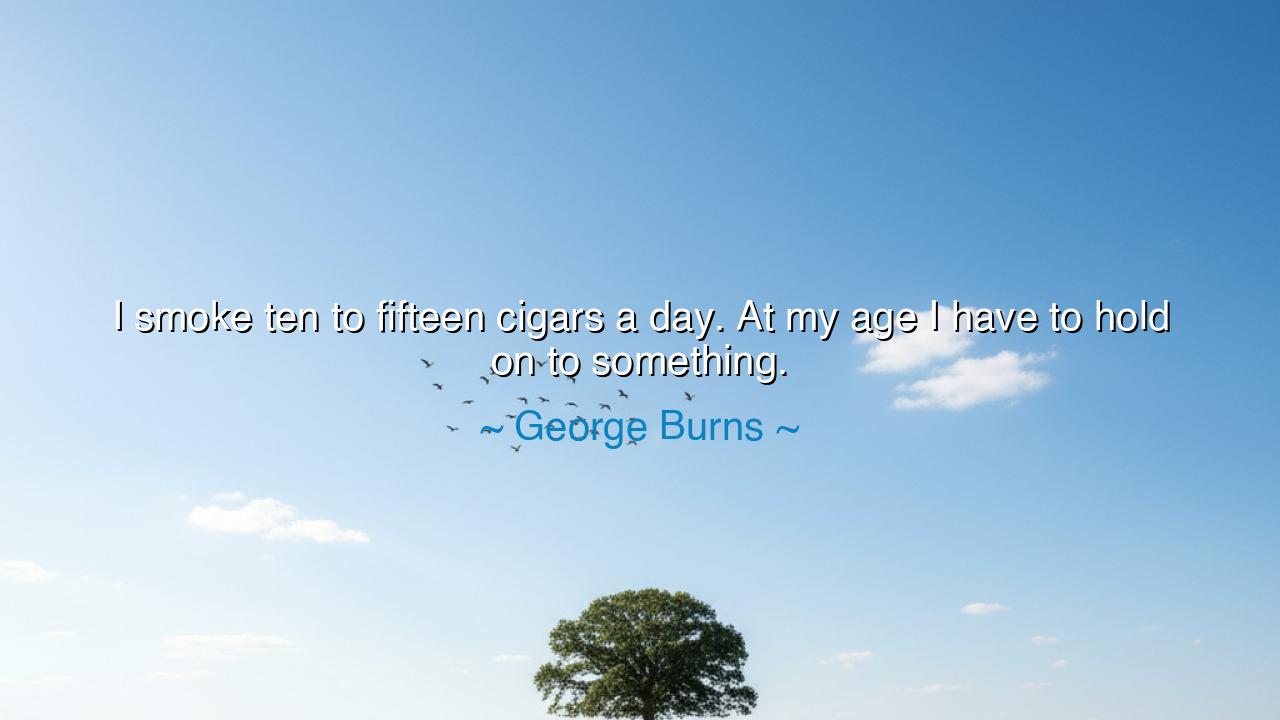
I smoke ten to fifteen cigars a day. At my age I have to hold on






"I smoke ten to fifteen cigars a day. At my age I have to hold on to something." These words, spoken by the legendary George Burns, are a testament to the quiet resilience of the human spirit. They are not simply about cigars or habits; they are about holding on—about finding something to anchor us as we journey through the inevitable passage of time. Burns, with his trademark wit and self-awareness, imparts a profound truth: even in our later years, even when the body weakens, we must cling to something, whether it be a habit, a passion, or a belief. It is a reminder that life, in all its unpredictability, can be borne only when we grasp onto something meaningful.
In the annals of human history, those who have lived long have often sought out small comforts to see them through the years. Socrates, the great philosopher, found solace not in riches or fame, but in his unwavering commitment to knowledge. He clung to his search for truth, even as the world around him swirled in chaos. Similarly, George Burns, at the ripe age of 80 and beyond, found his own anchor in the simplicity of a cigar. It is not the cigar itself, but the act of holding on to something familiar, something that provided him with comfort and control in a world that often seems indifferent to age.
For Burns, it was a choice. It was an acknowledgment that, as time marches on, we must find ways to defy its relentless march. And what better way than through humor, through irony, and through the small pleasures that make life bearable? The cigar is a symbol of that rebellion, a rebellion not against life, but against the fear of losing oneself in the face of mortality. It reminds us that there is power, even in our vices, as long as we acknowledge them and hold onto them consciously, with purpose and understanding.
Consider the story of Winston Churchill, who, in his later years, clung to his cigars and brandy as steadfastly as he clung to his sense of duty. Though his body grew frail, his spirit remained unyielding, powered by the rituals that had defined him. Churchill's cigars were not simply indulgences—they were symbols of his tenacity, of his unyielding will to face each day with purpose. Like Burns, he recognized the necessity of holding on to something that kept him rooted in the world, even as age threatened to sweep him away.
In our own lives, we, too, must ask ourselves what we cling to. What is our anchor in the storm? Is it our work? Our family? A hobby, a faith, or a small ritual that gives us comfort in moments of uncertainty? We must all find something to hold onto, not merely to survive, but to thrive. The cigars of George Burns were not just about habit—they were his small act of rebellion against time's tyranny, his defiance of the inevitability of age. He understood that, in this life, to hold on to something, no matter how small, is to affirm life itself.
The lesson is clear: as we grow older, or as we face difficult moments in life, we must find something to hold on to. It does not have to be monumental; it could be something as simple as a routine or a small joy that offers us comfort and strength. But the key is this: without something to anchor ourselves to, we risk drifting aimlessly, lost to the tides of time. Like Burns, we must each find our own cigar, our own anchor, and hold on with all the might of our spirit.
Let us then take a page from the book of George Burns and others like him, who faced life with humor and determination. Let us not shy away from our habits, but instead, recognize that they can be a source of power, a way to hold on as we march forward. Embrace what gives you comfort, whether it be a tradition, a passion, or a simple act, for it is through these small moments that we remain tethered to the world, and through them, we find the strength to continue the journey.






AAdministratorAdministrator
Welcome, honored guests. Please leave a comment, we will respond soon